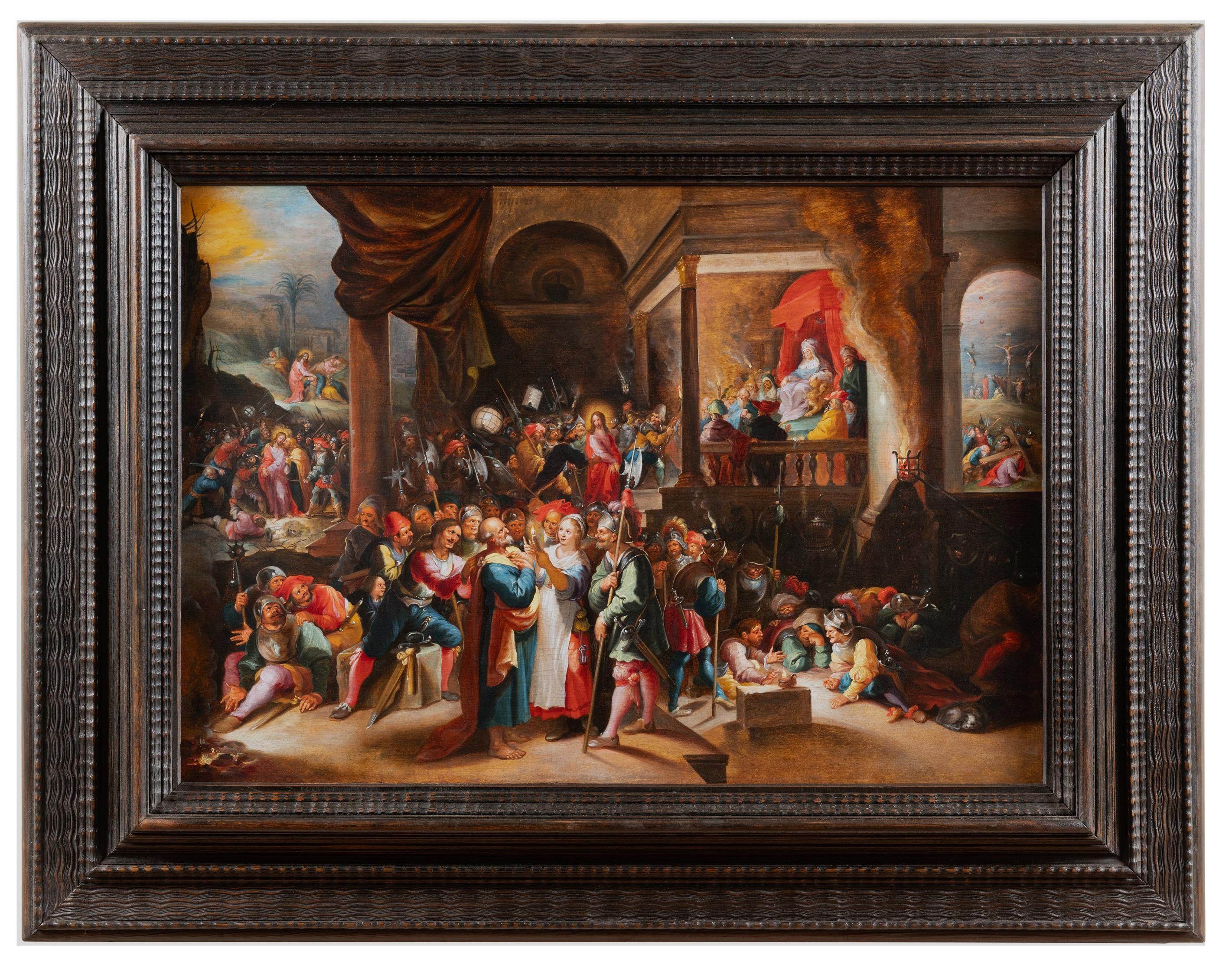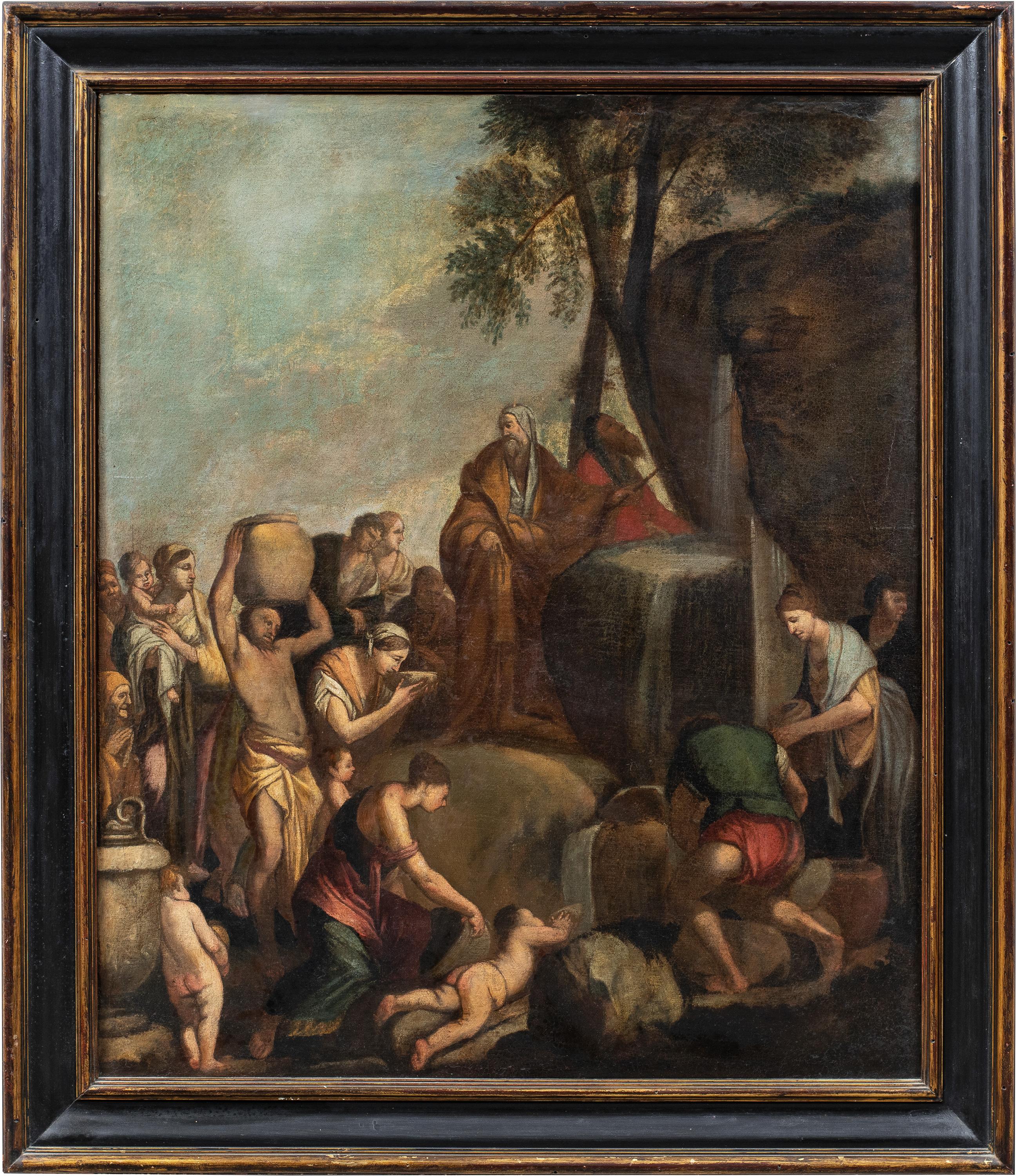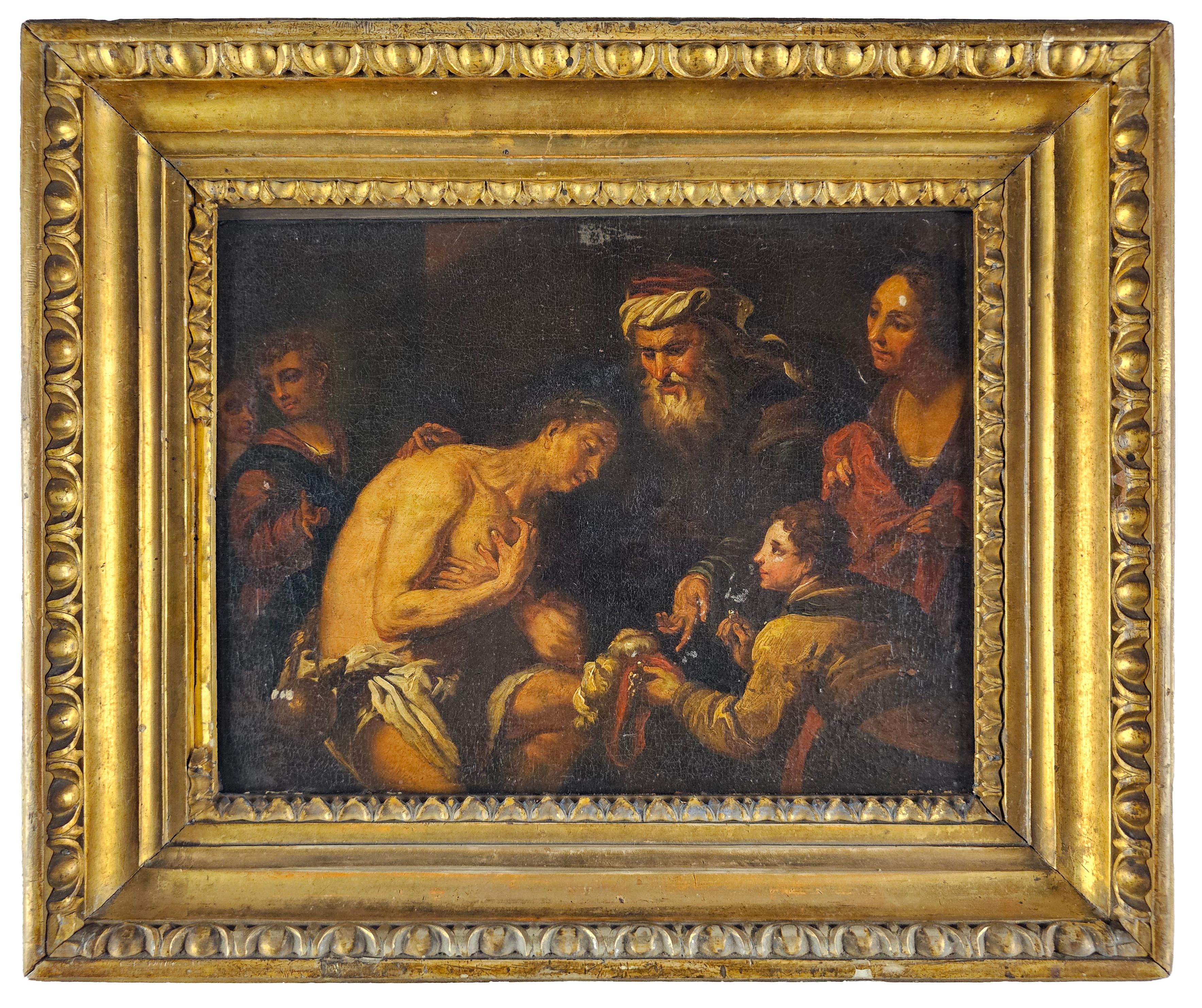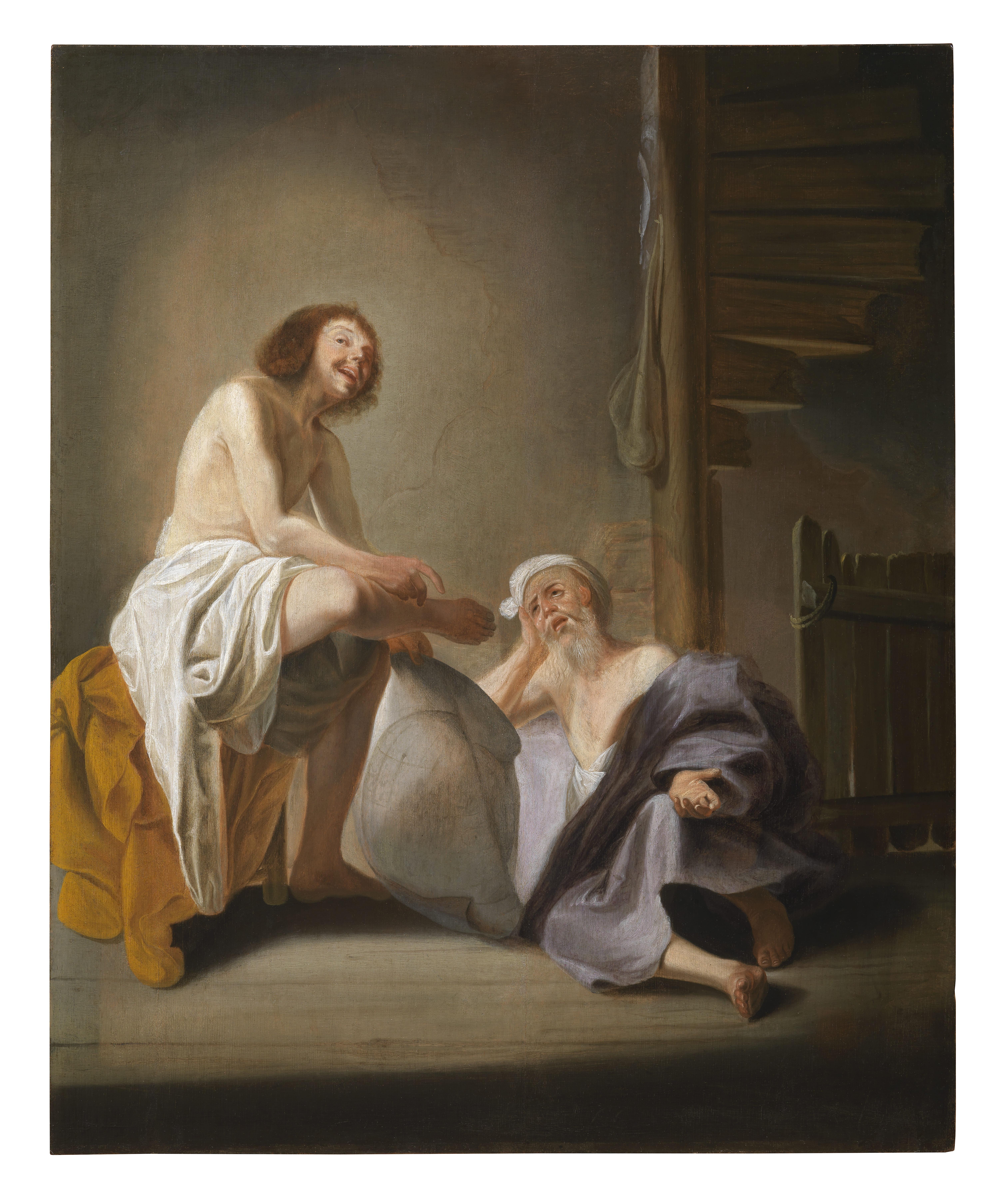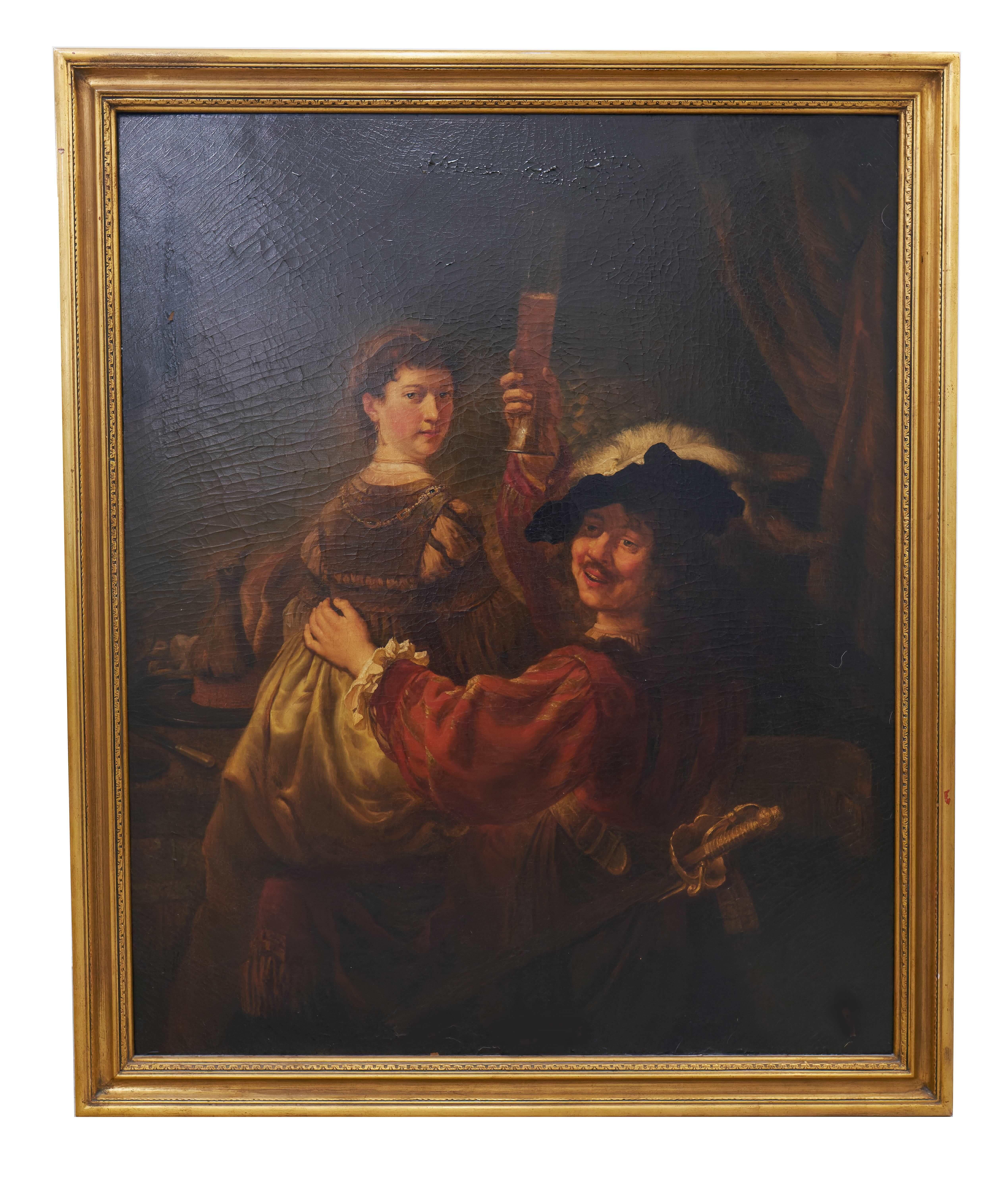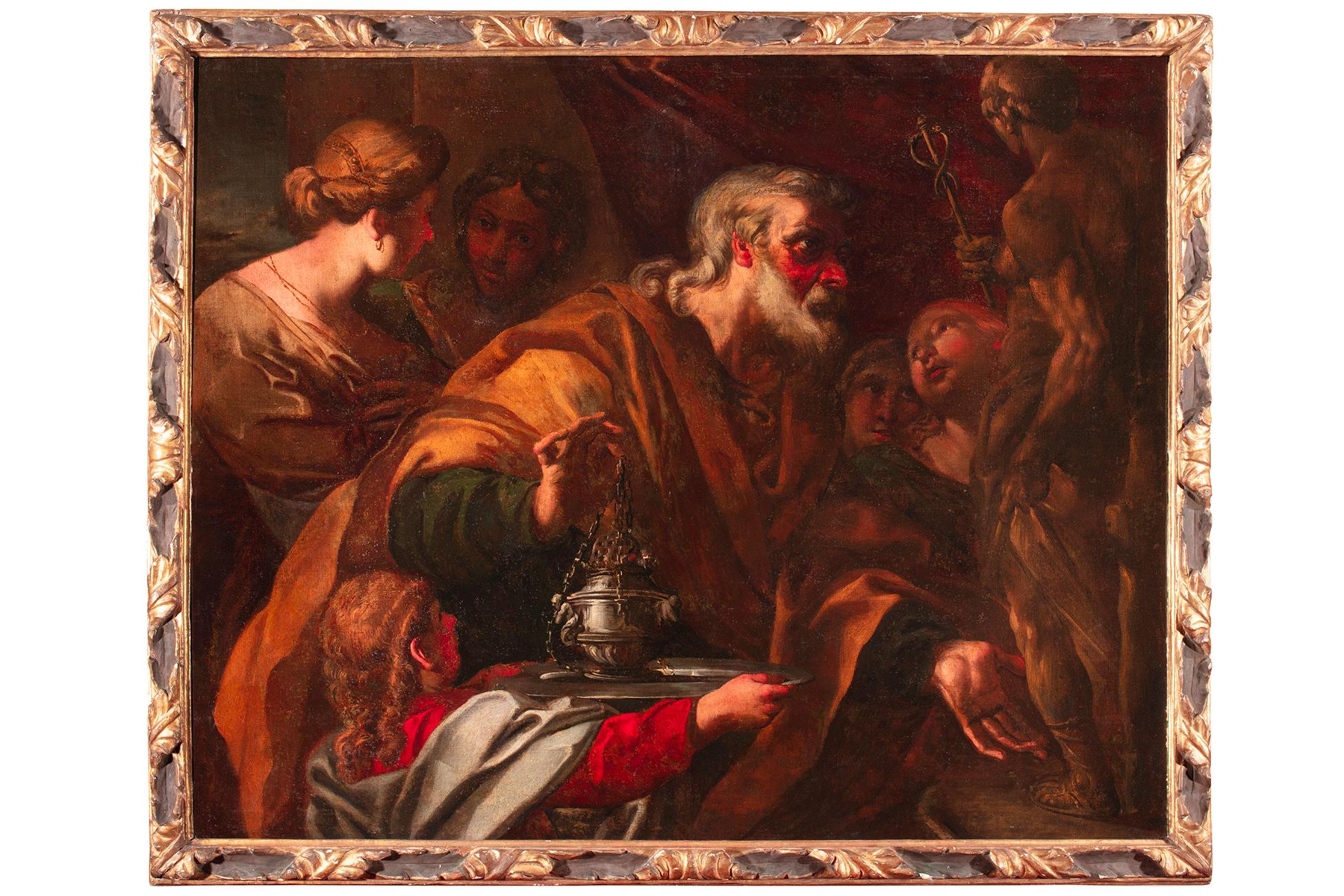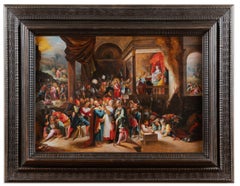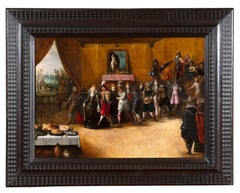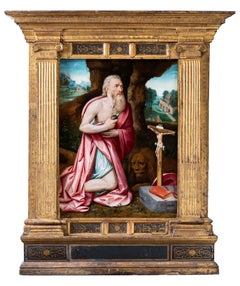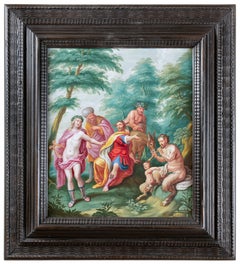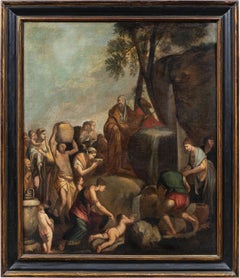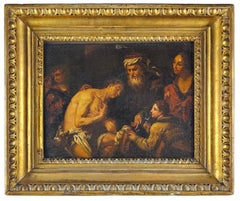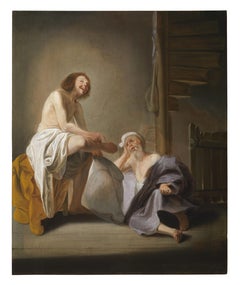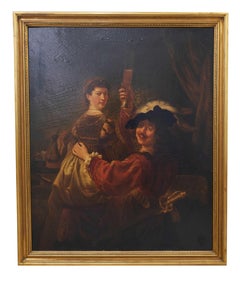Items Similar to Diogenes looking for a man, studio of Pieter Van Mol, Paris, 17th century, Paris
Video Loading
Want more images or videos?
Request additional images or videos from the seller
1 of 14
Diogenes looking for a man, studio of Pieter Van Mol, Paris, 17th century, Pariscirca 1640-1650
circa 1640-1650
$17,166.83
£12,835.64
€14,500
CA$24,041.55
A$26,430.95
CHF 13,662.57
MX$316,263.17
NOK 172,486.84
SEK 161,711.23
DKK 110,459.99
About the Item
Diogenes with his lantern looking for an honest man
Studio of Pieter Van Mol (Antwerp 1599 – Paris 1650)
Paris, mid-17th century
Oil on canvas, h. 44.5 cm, w. 54 cm
Not signed
Louis XIV period richly carved giltwood frame with flowered corners.
Framed: h. 60 cm, w. 68.5 cm
Our work, at the crossroads of the influences of Rubenism and Caravaggism, is distinguished by its intriguing staging with dramatic chiaroscuro magnified by a brilliant and shimmering palette.
The subject, rarely represented in Nordic painting, is inspired by an anecdote taken from the life of Diogenes of Sinope, a Cynic philosopher of the 4th century BC, famous for his caustic wit, his contempt for wealth and conventions, and his existence stripped of all superfluity. Walking through Athens at midday with a lantern in his hand, Diogenes would answer those who questioned him: "I am looking for a (real) man," thereby meaning that the human beings he met were not worth being called as such because of their vices.
In a tight frame, the philosopher appears surrounded by several figures seen from the bust: men and women of different ages. The philosopher appears as a grizzled old man with a long beard wearing a coat with wide purple and yellow draperies. The hand holding the lantern is a central element of the painting, casting its light only on a young man wearing a feathered beret and wrapped in a large coat. The painter places intense lighting on this chivalrous figure, all dressed in a bright red, typical of Rubens' palette. The color and light set this young man apart from the rest of the group, suggesting to the viewer that this is probably a real man, his youth and beauty worth more than the supposed wisdom of the two old men with tired features who remain in the shadows.
In a typically Mannerist approach where gestures take on significant proportions, the painter introduces a very young boy whose head and shoulders are only visible, pointing at the lantern in order to draw the viewer's attention to the object in question.
Finally, a mysterious young woman hides behind the figure of Diogenes, her head with a languid expression, barely lit, appearing from the half-light that serves as the background of the painting.
Our work is inspired by two paintings with the same subject by the Parisian painter of Antwerp origin Pieter Van Mol and was probably created by a student in the workshop during his long Parisian career (around 1625-1650). Thus, we feel in our painting this Flemish baroque style tempered by French classicism. Peter Van Mol in turn seems to have borrowed the subject from his colleague Peter Paul Rubens.
The singular style, both Caravaggesque and Rubensian, expresses the Antwerp training of Pieter Van Mol, first of all the chiaroscuro influenced by Abraham de Janssens (Antwerp, 1575-1632) known for having studied in Rome and Peter Paul Rubens for the colors and the baroque spirit.
Related works:
- Diogenes looking for a Man, Musée des Beaux-Arts d'Orléans, oil on canvas, 111.7 cm x 175 cm, inv. 1320
- Diogenes looking for a Man, Drawing on paper, 14.8 x 18 cm, signed, Graphic Collection, Stadel Museum, Frankfurt, Germany, inv. 3234
- Diogenes looking for a Man, Sotheby's Sale, oil on panel (65x84.6 cm), 01/27/2022, lot n 6, ex collection of Lucien Bonaparte
Pieter Van Mol is a little-known artist, born in Antwerp, apprentice of Artus Wolffert, received master in Antwerp in 1622. It is assumed that he accompanied Rubens when he came to Paris in 1625, and then remained in the city where he made his career.
Having benefited from a rapid reputation, he received numerous commissions and became the ordinary painter to the king in 1637 and the painter to Queen Anne of Austria in 1640. In 1648 he was among the founding members of the Royal Academy of Fine Arts.
- Creation Year:circa 1640-1650
- Dimensions:Height: 23.62 in (60 cm)Width: 26.85 in (68.2 cm)
- Medium:
- Movement & Style:
- Circle Of:Pieter Van Mol (1906 - 1988)
- Period:Mid-17th Century
- Condition:
- Gallery Location:PARIS, FR
- Reference Number:1stDibs: LU2433216657742
About the Seller
No Reviews Yet
Vetted Professional Seller
Every seller passes strict standards for authenticity and reliability
1stDibs seller since 2023
17 sales on 1stDibs
- ShippingRetrieving quote...Shipping from: PARIS, France
- Return Policy
Authenticity Guarantee
In the unlikely event there’s an issue with an item’s authenticity, contact us within 1 year for a full refund. DetailsMoney-Back Guarantee
If your item is not as described, is damaged in transit, or does not arrive, contact us within 7 days for a full refund. Details24-Hour Cancellation
You have a 24-hour grace period in which to reconsider your purchase, with no questions asked.Vetted Professional Sellers
Our world-class sellers must adhere to strict standards for service and quality, maintaining the integrity of our listings.Price-Match Guarantee
If you find that a seller listed the same item for a lower price elsewhere, we’ll match it.Trusted Global Delivery
Our best-in-class carrier network provides specialized shipping options worldwide, including custom delivery.More From This Seller
View AllHieronymus FRANCKEN III - The Denial of Saint Peter, 17th c. Antwerp school
Located in PARIS, FR
Hieronymus FRANCKEN III (Antwerp 1611 - 1671)
17th century Antwerp School
The Denial of Saint Peter
Oil on panel, dim. h. 53 cm, l. 76 cm
Framed, h. 82 cm, l. 106 cm
Sold with the ...
Category
Mid-17th Century Old Masters Figurative Paintings
Materials
Oil, Wood Panel
Attributed à H. Francken II, 17th c. Anwerp - The prodigal son among courtesans
Located in PARIS, FR
The Prodigal Son Among Courtesans
Attributed to Hieronymus Francken II (Antwerp 1578-1623)
Early 17th century Antwerp school
Oil on oak panel,
Dimensions: H. 52.5 cm (20.67 in), W. 74 cm (29.14 in)
Flemish-style moulded wood frame
Frame: h. 78 cm (h. 30.70 in.), w. 100 cm (39.37 in.)
At first glance, this festive and joyful painting depicts a group of elegantly dressed people dancing to the sound of an orchestra in a richly decorated interior with a wide opening onto a rural exterior. However, the real theme is cleverly concealed by the painter and is only discernible through the artifice of a small scene in the background where we see a half-naked man, in the company of the pigs next to a makeshift shelter.
In fact, beyond the pleasant and apparently superficial character of the painting, it is a subject taken from the parable of the prodigal son in the Gospel. The illustrated episode is the prodigal son among courtesans.
Even if the viewer's attention is drawn to the central couple (prodigal son embracing a pretty courtesan) doing the dance steps, the artist takes care in a narrative approach of all the groups and ancillary scenes in order to create a rich and varied composition. Thus the musicians seated on a raised platform are depicted with great skill, their faces animated, their clothes abundantly varied.
The theme of music, which has always been associated with that of sensuality and physical love, helps to exacerbate licentious pleasures.
The merry company dances "Spanish pavane", a slow court dance from the sixteenth century, danced close to the ground by couples arranged in a procession, which was probably introduced to the south of the Netherlands around 1600 during the governance of Albrecht VII and the daughter of the King of Spain Isabella Clara Eugenia in Brussels.
The interior of the house is also carefully elaborated, the embossed leather dyes on the walls, the middle sideboard (typical in Francken interiors), where the rich gold and silver crockery is placed in front of the painting "Andromeda chained to the rock and Perseus arriving to rescue her". The inclusion of a contemporary and probably extant pictorial work is also one of the characteristics of the Francken family, among them Frans Francken the Younger...
Category
Early 17th Century Old Masters Interior Paintings
Materials
Oak, Oil
Saint Jerome, Antwerp, 16th century, circa 1550, cercle of Lambert Van Noort
Located in PARIS, FR
Saint Jerome in the desert
Cercle of Lambert Van Noort (1520-1571, Antwerp)
Antwerp School, mid-16th century
Oil on oak panel.
Dimensions: panel h. 69 cm (27.16 in), l. 52.5 cm (20.6...
Category
16th Century Old Masters Figurative Paintings
Materials
Oil, Wood Panel
The Musical Contest between Apollo and Marsyas, signed P. Sion, Antwerp 17th c.
Located in PARIS, FR
The Musical Contest between Apollo and Marsyas,
by Peter Sion (Antwerp, 1624-1695)
Signed in the lower right corner P. Sion
17th century Antwerp School
Oil on copper, dim. h. 53 cm, ...
Category
17th Century Old Masters Figurative Paintings
Materials
Oak, Oil, Wood Panel
Cercle of Ambrosius Francken, Adoration of the shepherds, 17th century Antwerp
Located in PARIS, FR
Adoration of the shepherds,
Cercle of Ambrosius Francken,
Early 17th century Antwerp school
Oil on oak panel: h. 55 cm, w. 43 cm (21.65 in x 16.93 in)
17th c. ebonized and moulded f...
Category
Early 17th Century Old Masters Figurative Paintings
Materials
Oil, Wood Panel
The Rape of Europa, signed Peter Sion (1624-1695), Antwerp, 17th century
Located in PARIS, FR
The Rape of Europa
By Peter Sion (Antwerp, 1624-1695)
Signed in the lower right corner P. Sion
17th century Antwerp School
Oil on copper, dim. h. 53 cm, w. 45 cm
Moulded and ebonized...
Category
17th Century Old Masters Figurative Paintings
Materials
Oak, Oil, Wood Panel
You May Also Like
Giulio Carpioni workshop (Venetian) - 17th century figure painting - Moses
By Giulio Carpioni
Located in Varmo, IT
Giulio Carpioni (Venice 1613 - Vicenza 1678) workshop of - Moses makes water flow from the rocks.
82 x 68 cm without frame, 97 x 83 cm with frame.
Oil on canvas, in wooden frame (n...
Category
Early 17th Century Baroque Landscape Paintings
Materials
Canvas, Oil
$2,966 Sale Price
28% Off
17 Century Italian School panel, The return of the prodigal son
Located in New York, NY
17th Century Italian School, wood panel, depicting the return of the prodigal son. Very good condition.
Category
17th Century Figurative Paintings
Materials
Oil, Wood Panel
$2,072 Sale Price
20% Off
17th Century By Paulus Bor Heraclitus and Democritus Oil on Panel
Located in Milano, Lombardia
Paulus Bor (Amersfoort, Netherlands, 1605 - 1669)
Title: Heraclitus and Democritus
Medium: Oil on panel
Dimensions: without frame 56 x 46 cm - with frame 77 x 67 cm
"Cassetta" frame ...
Category
17th Century Old Masters Figurative Paintings
Materials
Wood Panel, Oil
$71,508 Sale Price
20% Off
After Rembrandt "The Prodigal Son in the Tavern" Old Master Style Painting
Located in San Francisco, CA
After Rembrandt
"The Prodigal Son in the Tavern"
Old Master Style Painting
Late 19th century - Early 20th century
Oil on Canvas
36.75 x 44.5 unframed
40.5" x 48.5" framed
Category
Late 19th Century Dutch School Portrait Paintings
Materials
Canvas, Oil
17th Century by Filippo Abbiati Solomon sacrificing to idols Oil on Canvas
Located in Milano, Lombardia
Filippo Abbiati (Milan, Italy, 1640 - 1715)
Title: Solomon sacrificing to idols
Medium: Oil on canvas
Dimensions: without frame 117 x 146 cm – with frame 131 x 158 cm
Antique cassett...
Category
Late 17th Century Old Masters Figurative Paintings
Materials
Canvas, Cotton Canvas, Oil
Asklepios and His Followers
Located in Stockholm, SE
This captivating work belongs to Elias Martin’s later period, characterized by his exploration of historical, biblical, and mythological themes. As Mikael Ahlund, Director of the Gus...
Category
1810s Old Masters Figurative Paintings
Materials
Canvas, Oil
